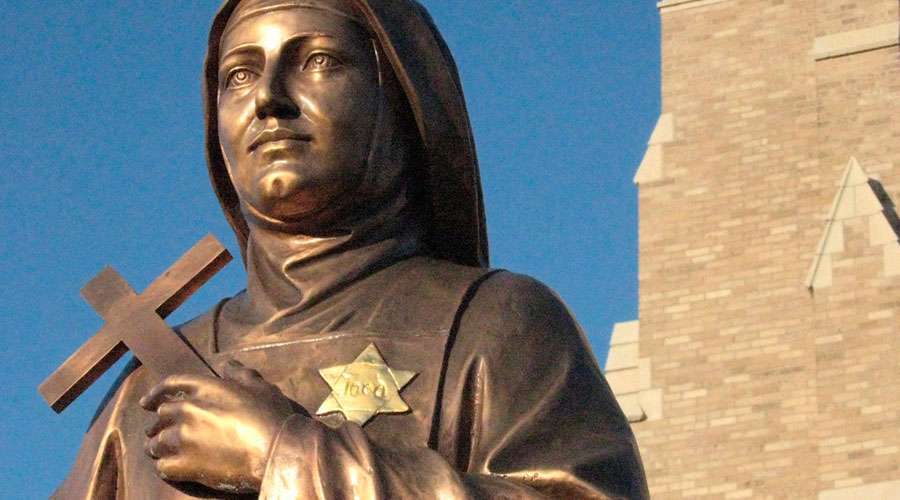
Let us better understand the mystery of the cross and the Christian meaning of suffering in the Church. We should consider that "we were born there" and that is where our strength lies: in the love of God the Father, in the grace that Jesus won for us through his self-giving and in the communion of the Holy Spirit (cf. 2 Cor 13:14).
The Christian's interior life is identified with his relationship with Christ.. Well, this life passes through the Church, and vice versa: our relationship with the Church necessarily passes through our personal relationship with Christ. In this body of Christ all the members must become like Christ "until Christ is formed in them" (Gal 4:9).
Therefore, says Vatican II and the Catechism of the Catholic Church, "We are integrated into the mysteries of his life (...), we are united to his sufferings as the body to its head. We suffer with him in order to be glorified with him" (Lumen gentium, 7; CCC 793).
The mystery of the cross of Christ, and with it the Christian meaning of suffering, is illuminated when we consider that it is the Holy Spirit who unites us in the Mystical Body (the Church). So much so that every Christian should one day be able to say: "I complete in my flesh what is lacking in the sufferings of Christ for the sake of his Body, which is the Church" (Col 1:24). And this, in order to accompany the Lord in his profound and total solidarity that led him to die for us, in reparation and expiation for the sins of all people of all times.
Jewess, philosopher, Christian, nun, martyr, mystic and co-patroness of Europe. She considers that man naturally flees from suffering. Whoever finds pleasure in suffering can only do so in an unnatural, unhealthy and destructive way.

On August 9, the feast of saint Edith Steinwhose testimony of conversion from Judaism to Catholicism has touched thousands of faithful.
And he writes, "Only someone whose spiritual eye is open to the supernatural connections of world events can desire the atonement; but this is only possible with persons in whom the Spirit of Christ lives, who receive his life, power, meaning and direction as members of the head" (E.Stein, Werke, XI, L. Gelber and R. Leuven [eds.], Druten and Freiburg i. Br.-Basel-Vienna 1983).
On the other hand," he adds, "the atonement connects us more intimately with Christ, just as a community is more deeply united when all work together, and as the members of a body are ever more strongly united in their organic interaction. And from this he draws a surprisingly profound conclusion:
But since "to be one with Christ is our happiness and to be one with Him is our blessing on earth, love for the cross of Christ is in no way opposed to the joy of our divine sonship" (froher Gotteskindschaft). Helping to carry the cross of Christ gives a strong and pure joy.And those who are allowed and able to do so, the builders of the Kingdom of God, are the most genuine children of God (Ibid.).
As a seal (reinforcement and confirmation) that Opus Dei was truly of God and that it was born in the Church and for the service of the Church, St. Josemaría experienced in the early years of the Work difficulties and at the same time lights and consolations from God.
Years later he wrote: "When the Lord gave me those blows, around the year thirty-one, I did not understand. And suddenly, in the midst of that great bitterness, those words: you are my son (Ps. II, 7), you are Christ. And I only knew how to repeat: Abba, Pater, Abba, Pater, Abba, Abba, Abba, Abba!
Now I see it in a new light, as a new discovery: as one sees, as the years go by, the hand of the Lord, of divine Wisdom, of the Almighty. You have made me understand, Lord, that to have the Cross of Christ is to find happiness, joy. And the reason - I see it more clearly than ever - is this: to have the Cross is to identify oneself with Christ, to be Christ, and, therefore, to be a child of God" (Meditation, April 28, 1963, quoted by A. de Fuenmayor, V. Gómez-Iglesias and J. L. Illanes, El itinerario jurídico del Opus Dei. Historia y defensa de un carisma, Pamplona 1989, p. 31).
Jesus suffers for us. He bears all the pains and sins of the world. To overcome the immensity of evil and its consequences, he ascends the cross as a "sacrament" of the passion of love that God experiences for us.
As a fruit of the cross and on behalf of the Father, Jesus gives us the Holy Spirit, who unites us in his Mystical Body and gives us the life that comes from the pierced Heart. He invites us, in fact, to complete with our life (the greater part of it are small and ordinary things) what is lacking in the sufferings of Christ in and for this body that we form with Him, the Church.
Therefore, "what heals man is not the avoidance of suffering and flight from pain, but the ability to accept tribulation, to mature in it and to find meaning in it through union with Christ, who suffered with infinite love" (Benedict XVI, Encyclical Spe Salvi, 37).
Two years ago, on the feast of the Exaltation of the Holy Cross, and in his homily at Santa Marta (14-IX-2018), Francis said that. the cross teaches us this, that in life there is failure and victory.. We must be able to tolerate and patiently endure defeats.
Even those that correspond to our sins because He paid for us. "Tolerate them in Him, ask forgiveness in Him" but never allow ourselves to be seduced by that chained dog that is the devil. And he advised us to be quiet at home, we were to take 5, 10, 15 minutes in front of a crucifixThe small crucifix on the rosary, perhaps: to look at it, because it is certainly a sign of defeat that provokes persecution, but it is also "our sign of victory because God has won there." In this way we can turn (our) defeats into (God's) victories.
Mr. Ramiro Pellitero Iglesias
Professor of Pastoral Theology, School of Theology, University of Navarra.
Published in Church and new evangelization.